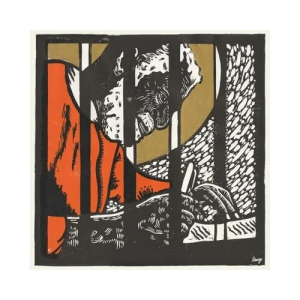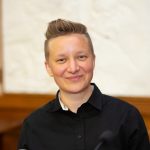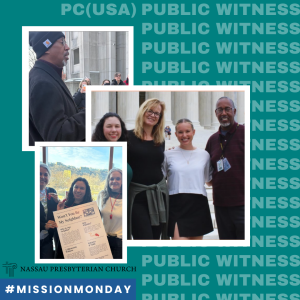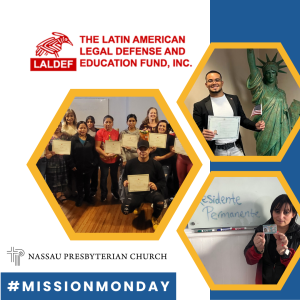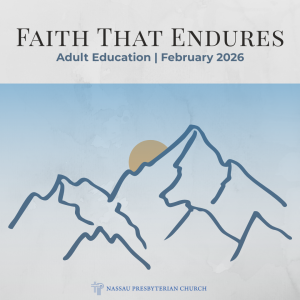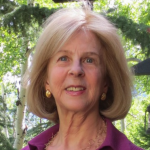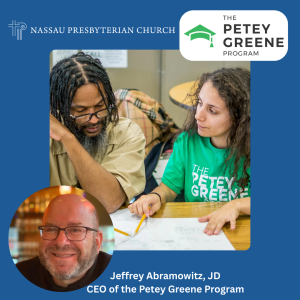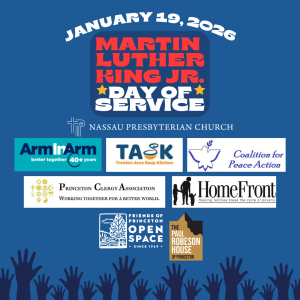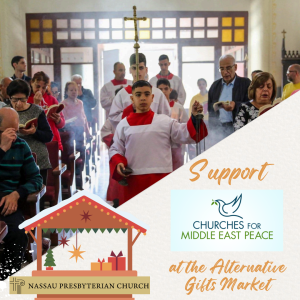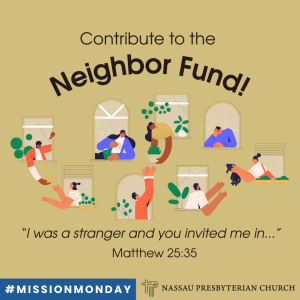 Nassau Church invites all our community members and friends to support the Neighbor Fund!
Nassau Church invites all our community members and friends to support the Neighbor Fund!
This initiative of the Princeton community provides financial support to people in our area who are impacted by immigration. Your generosity makes it possible for this Fund to meet the needs of neighbors whose family networks, livelihoods, and stability have been disrupted. You can learn more and contribute to the Fund using the button below.
Whether or not you can make a gift at this time, you can support immigration-impacted neighbors by keeping them in your prayers and hearts.
“I was a stranger, and you invited me in” (Matthew 25:35).
On Sunday, February 15, 2026, John Thurber gave a Moment for Mission during our Service of Worship focusing on the Neighbor Fund:
How it Began
Last summer, in the wake of large-scale immigration operations by ICE here in Princeton, our Mission and Outreach Committee launched the Neighbor Fund alongside our trusted community partners. We began with a seed of $20,000 and a simple, faithful prayer: that we might provide a measure of justice and stability to families whose lives had been upended by ICE detentions.
Today, we witness to an abundance of generosity that has far exceeded our initial hopes.
Through your support, and the radical generosity of the wider community, we have already raised over $150,000. Most movingly, 75% of these contributions have come from outside our own doors. Nassau Church has become a trusted vehicle for the whole community’s desire to do what is right.
We have seen neighbors helping neighbors—many with no formal ties to this sanctuary—who recognized in the Neighbor Fund a clear, equitable, and compassionate way to put love into action.
How the Funds Are Working
These funds are working every day. They are paying legal fees that give parents a fighting chance to stay with their children and covering rent and groceries for families who have lost their primary breadwinner to detention.
To date, we have supported 13 families and individuals with nearly $104,000 in committed funds.
The Need Continues
But the need is not a thing of the past. We continue to receive new requests for assistance, all related to ongoing ICE activity in our area.
Just one month ago, two more Princeton residents were detained, including a father of four from the Witherspoon Jackson neighborhood who has a child at Community Park School. A week later, a third resident was detained on his way home from work.
These incidents remind us that we are no longer responding to a single operation; we are sustaining a covenant of protection for the vulnerable in our midst.
We are not just a church in the heart of Princeton; we are a heart for the people of Princeton.
How You Can Help
As we anticipate what may happen in the months ahead, we ask you to consider a renewed, generous gift to the Neighbor Fund. Your support ensures that when our neighbors call out in a moment of fear or financial crisis, we remain ready to answer.
You can support the Neighbor Fund with a designated gift online or by writing “Neighbor Fund” in the memo line of your check.
Thank you for your continued prayers, your trust, and your unwavering resolve to build a community where every neighbor is welcomed and respected.

